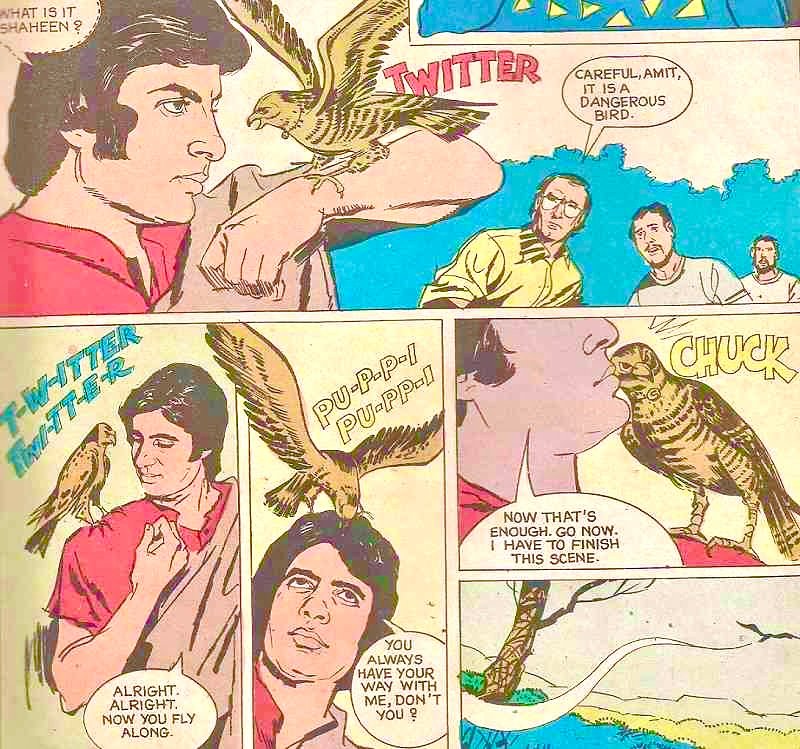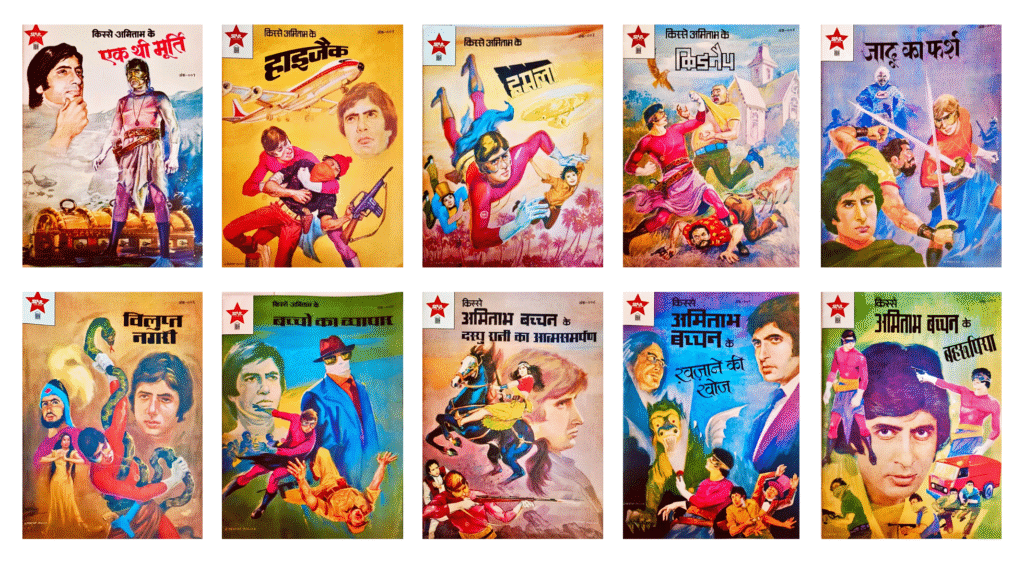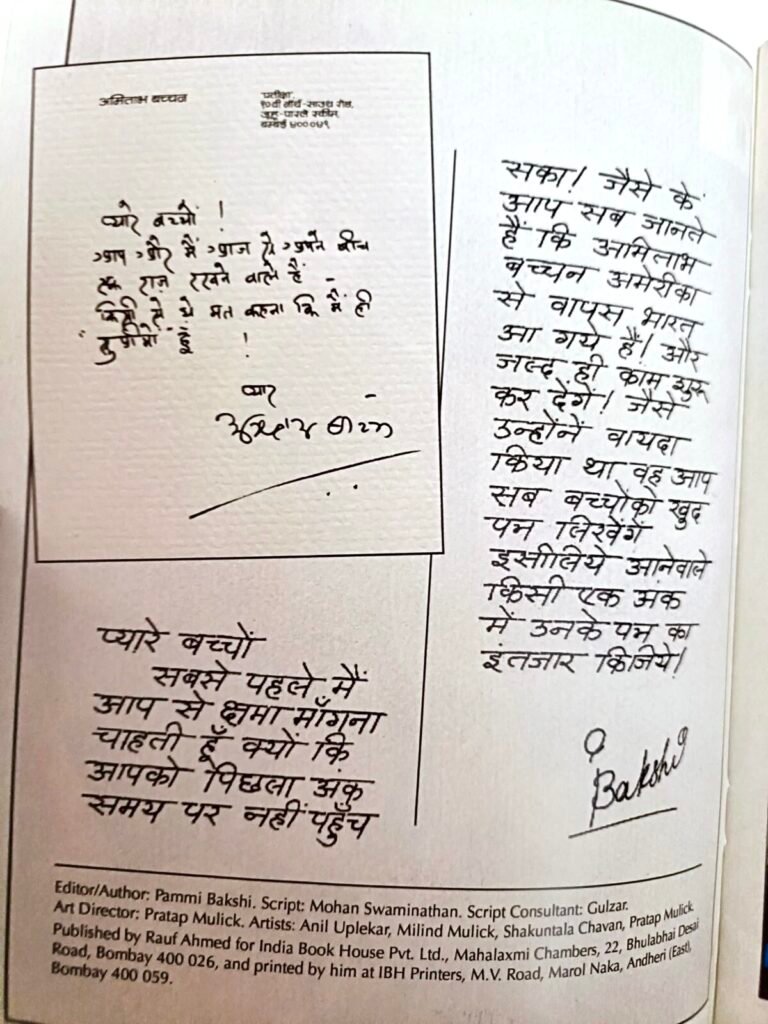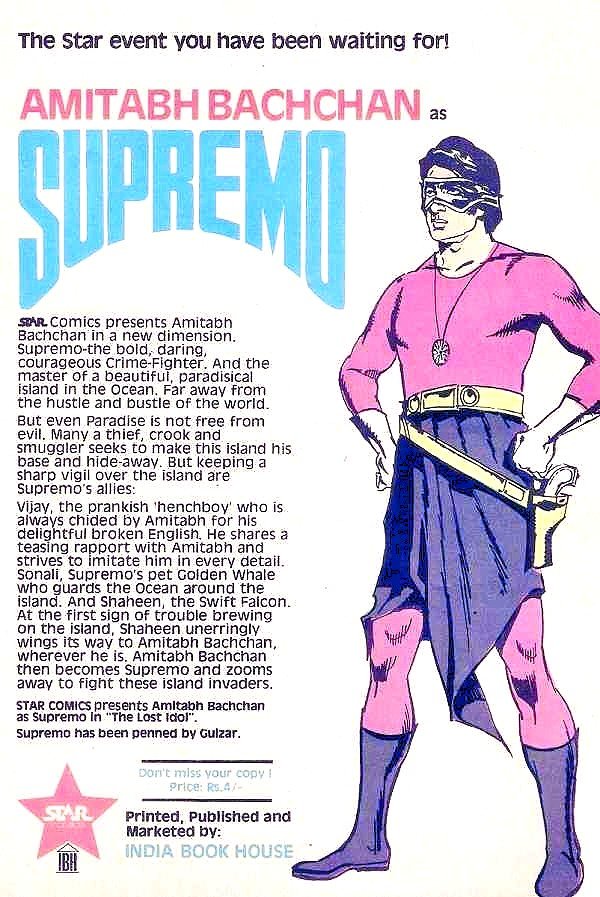Supremo Unmasked: The Strange Superhero Past of Amitabh Bachchan

In the 1980s, Amitabh Bachchan wasn’t just India’s biggest movie star—he was a cultural force. His movies filled theaters, his dialogues echoed in everyday conversations, and his characters shaped popular imagination. But for a brief and fascinating period, he was more than a superstar—he was a superhero.
I know this not just from reading about it, but from experience. As a kid, I owned the Adventures of Amitabh Bachchan comics. Flipping through those pages, I wasn’t just reading about Supremo—I was stepping into a world where my favorite actor fought hijackers, dacoits, and even aliens. Those colorful panels, the wild storylines, and the sight of Amitabh in superhero garb are etched deeply in my memory.
The Birth of a Comic Book Hero
The idea for the series came from Pammi Bakshi, editor of Movie magazine, who once overheard kids playing a game of superheroes. One boy chose Batman, another Superman—but one proudly declared he wanted to be Amitabh Bachchan, who could take on ten villains single-handedly. That playful declaration led to a radical thought: why not create a comic book superhero out of India’s biggest superstar?
Bakshi pitched the idea to Amitabh Bachchan while he was filming Pukar in Goa. He agreed readily, lending his persona without interfering in the creative process. The name Supremo was borrowed from Randhir Kapoor’s nickname for him. With Gulzar as script consultant and Amar Chitra Katha artist Pratap Mullick sketching the visuals, the stage was set.

Supremo: The Hero We Knew
Supremo was unique because he wasn’t a mythical figure from another world—he was Amitabh himself, living a secret life as a crime-fighter.
- Look: A snug costume with a fisherman’s wrap, a chakra pendant, and enormous sunglasses that hid his identity.
- Quirks: He munched peanuts and carried a Walkman—because music was his passion.
- Allies: Two boys named Vijay and Anthony (a nod to his famous movie characters), a loyal dolphin Sonali, and a falcon named Shaheen, inspired by Coolie.
Unlike Batman or Superman, Supremo had no superpowers. What he did have was intelligence, courage, and the sheer charisma of Amitabh Bachchan—a superhero powered by stardom itself.
Adventures on the Page
The comics were advertised as “The Star event you have been waiting for!”, and for kids like me, they lived up to the hype. The series ran for two years under India Book House’s Star Comics imprint and spanned 10 thrilling issues released in both English and Hindi:

- The Lost Idol (Ek Thi Moorti)
- Hijack (Hijack)
- Invasion (Hamla)
- The Kidnap (Kidnap)
- The Disappearing Floor (Jaadu Ka Farsh)
- The Lost City (Vilupt Nagri)
- The Innocent Victims (Bachchon Ka Vyapar)
- Supremo & the Dacoit Queen (Dasyu Rani Ka Aatamsamarpan)
- Treasure Island (Khazane Ke Khoj)
- The Imposter (Behrupiya)
I still remember the joy of reading The Lost Idol, where Supremo retrieves a temple statue stolen centuries ago, or The Lost City, which whisked us away to the mythical Atlantis. Every issue felt like a mix of Bollywood masala and superhero comic-book flair.
 More Than Comics
More Than Comics
Amitabh himself supported the series wholeheartedly. He insisted that copies be distributed to hospitals, orphanages, and welfare homes so every child could enjoy them. That only made owning those comics feel even more special. I wasn’t just holding a story—I was holding a piece of an era where Amitabh’s reach extended beyond the silver screen into the colorful panels of pop culture.
The influence of Phantom comics was clear—Supremo had a private island where animals lived peacefully—but the stories were deeply rooted in Indian sensibilities, borrowing characters, settings, and even film directors like Manmohan Desai and Gulzar, who occasionally appeared on the page.

Why Supremo Faded Away
Despite the excitement, The Adventures of Amitabh Bachchan ended after two years. Pammi Bakshi, the driving force behind the project, moved abroad, and the series quietly came to a halt. Later attempts at similar comics—Rajinikanth in Tamil Nadu, Mammootty in Kerala, and even Sunil Gavaskar as “Sunny the Supersleuth”—never captured the same magic.
Looking Back
Owning the Supremo comics was like owning a slice of 1980s pop culture. For me, they were more than stories—they were proof that in India, cinema and mythology were one and the same. Amitabh Bachchan didn’t need superpowers. He was Supremo, and for a generation of readers like me, that was more than enough.
Even today, those rare issues are collectors’ treasures. They remind us of a time when Bollywood’s biggest star leapt out of the screen and into the world of comic books, becoming India’s very own superhero.
👁️ 227 views

